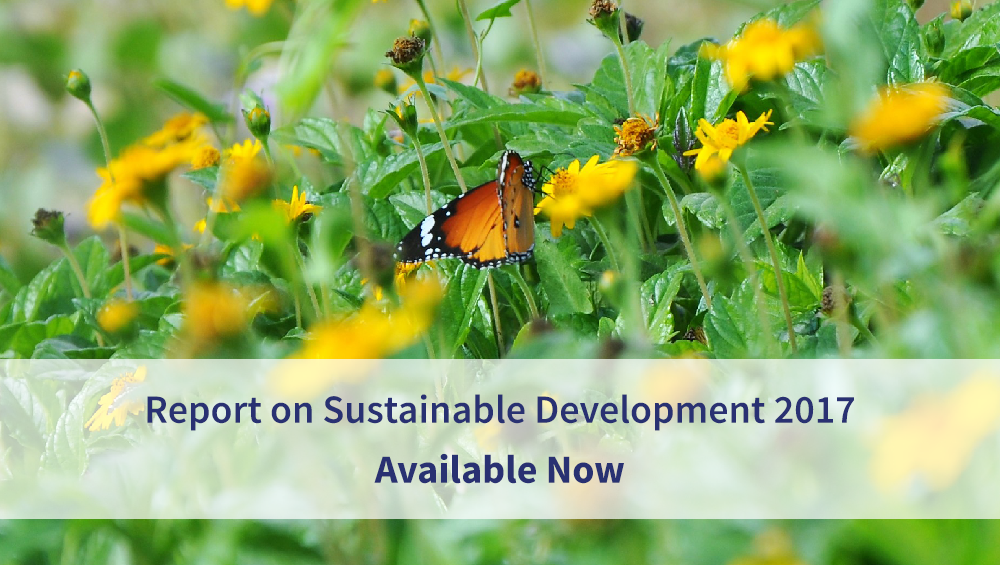In the 2017 Sustainability Report, SEKEM demonstrates its ongoing commitment to holistic sustainable development in Egypt within a year, that marked tremendous changes within the initiative itself as well as in the country. After SEKEM celebrated its 40th anniversary and after the death of its founder Ibrahim Abouleish in June 2017, SEKEM created a vision for 2057 in order to take further steps towards a sustainable future for Egypt.
“It was always my father’s goal to address environmental, economic societal and cultural challenges holistically. Following his lead, we continued to formulate our vision and mission for 2057 in all four spheres of life. As my father accomplished a miracle in the desert within the past 40 years, we also wish to realize many more miracles inspired by his philosophy,”
Helmy Abouleish, CEO of SEKEM Group
The SEKEM Future Council together with SEKEM employees amplified the SEKEM Vision for 2057: SEKEM as an international Center of Excellence for holistic, sustainable, individual, organizational, and societal transformation in Egypt and the world.
By highlighting SEKEM’s recently published scheme of its mission for 2057 and goals for 2027, the Sustainability Report comes differently this time with a thorough perspective on the future. However, the report still keeps its interactive framework of delivering deep insights to SEKEM’s commitment and consistency in its everyday life as the previous years. That is shown through a combination of indicators, statistics, and references to publications from the SEKEM News.
Economic development and consolidation
In 2017, the economic situation in Egypt continued to be affected by the Egyptian currency devaluation that occurred in November 2016 and consequently impacts the local market. In spite of such a challenging situation, SEKEM was able to reach satisfying economic results, not least by the support of its long-standing partners. For instance, SEKEM could achieve EGP 476.45m net sales, representing a growth of over 25% in its economic value creation. Together with its reliable network, SEKEM was able to set long-term financial strategies that put the Economy of Love concept in the foreground for the coming 40 years.
Find out more about SEKEM’s economic life 2017 here!
Social transformation
The SEKEMsophia governance structure is considered as one of the milestones in 2017, which SEKEM aims to disseminate in all Egypt within the coming ten years. The system is not only set to find agile, resilient and holistic governance for the SEKEM Initiative but is also determined for human development and creating value for the society. SEKEM also works on enhancing the healthcare sector in Egypt through its Medical Center. The initiative integrated new services there, such as physical therapy and premature birth services. Hence, the number of SEKEM’s employees’ visits to the Medical Center has even exceeded the target to reach 6855 visits. With the support of SEKEM’s friends and partners, SEKEM could summarize its mission and goals for 40 years ahead; among many targets, SEKEM is heading towards creating a real inclusive social transformation in Egypt.
Find out more about SEKEM’s social engagement 2017 here!
Enriching Cultural Dialogues
The donation from the long-standing SEKEM partner Lebensbaum Foundation enabled Heliopolis University and SEKEM to realize the Space of Culture. This one main project of SEKEM in 2017 is a melting pot of various international cultures which the Initiative aims to spread in all Egypt by 2057. The opening of the Space of Culture in 2017 explains the increase in the total cultural and arts training hours provided to the SEKEM members than the previous year; it reached 8678 hours. At the Space of Culture’s theater, Heliopolis University held its first graduation ceremony – another milestone on the path of development.
Find out more about SEKEM’s cultural life 2017 here!
Sustainable farming in all Egypt
Air and water pollution remained a difficult challenge to agriculture that not only SEKEM is facing but the whole of Egypt. By promoting sustainable water management or renewable energies, SEKEM could efficiently tackle this issue in the past year. In 2017 the number of SEKEM’s contracted farmers increased from 461 to 581 farmers. Together, they contributed in increasing the total biodynamically cultivated area in Egypt from 2670 to 3465 acres. SEKEM’s farmers represent one of its main cornerstones and are always the starting point for its closed value chain. For 2057, SEKEM envisions Biodynamic, sustainable and Organic farming as the mainstream agricultural methods in Egypt.
Find out more about SEKEM’s ecological commitment here!
Read the SEKEM Sustainability Report 2017 here
Press release on the SEKEM Sustainability Report 2017

